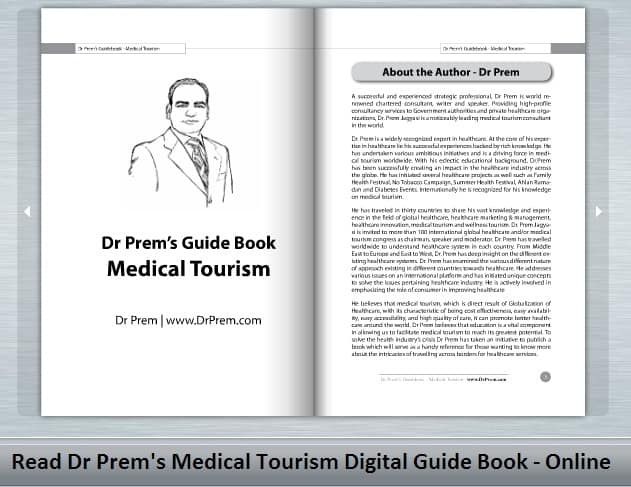The medical tourism industry is flourishing day by day and more patients are travelling to other countries to obtain affordable and high quality medical treatment. Before you board on your medical journey, you should consider the legal issues associated to this sector. It is important to understand the laws of your medical destination or country you plan to visit.
Guide to understanding legal issues in medical tourism
-
Key legal terms to understand for medical tourism
-
Legal concerns
-
Understanding legal recourse
-
Know and speak up for your patient rights as a medical tourist
-
Patient Rights
-
What you need to know about patient’s rights in medical tourism
-
Right to information
-
Right to make decision
-
Right to courtesy
-
Right to confidentiality
-
Right to receive continuity of care
-
Guidelines of patient rights as described by the American Medical Association
-
Speaking Up
-
Legal issues to consider when travelling overseas for medical tourism
-
What medical tourists need to know about legal recourse
-
Protecting yourself from legal issues during medical tourism
-
Questions about legal issues a medical tourist should ask
-
Tips medical tourists should know about legal issues
-
Please read the full guide here
-
Guide to understanding cultural issues in medical tourism
-
Guide to understanding ethical issues in medical tourism
-
Guide to understanding legal issues in medical tourism
-
Medical Tourism Quality, Legal, Ethical & Cultural Issues | MasterClass with Dr Prem
No one wants to face any type of legal problems while in a foreign country, especially medical tourists. It is the duty of medical facility provider and the medical tourist facility, to explain all the relevant legal matters to a patient in his understandable language.
- It is vital for a medical tourist to be aware of the recognized rules of the medical tourism destinations. If you are going abroad to seek for medical care, you should make yourself aware with the recognized laws related to medical practices in a particular company.
- The country in which you will be receiving medical care should have properly established laws governing medical tourism along with the legal body to enforce the law. These laws must be in the favor of medical tourism.
- It is important to consider the legal resource and the rights of the medical tourists in that country. Most medical facilities catering to the medical tourists have international accreditations with esteemed organizations, thereby promising high level of quality in the healthcare services.
- Healthcare professionals are becoming more aware of the importance of acknowledge a dynamic role for the patient. Public authorities need to identify the role of a patient and encourage their contribution in decision-making process.
- You should find out the level of legal recourse available to you in case of any problem arises during your treatment in foreign hospitals that are preferred by medical tourists. It is also vital to find out whether the legal body of your own country can take lawful action against the medical treatment provider of the destination country.
- Language is the main problem that arises in a foreign land and can bound the process of communication or can create problems in understanding the laws of the country. Therefore, it is important to hire a translator or you, who can help you to overcome all the barriers related to language.
Key legal terms to understand for medical tourism
While understanding the legalities involved in medical tourism and the legal system of the host countries, you must ensure that the treating region has the following guidelines in place:
- Established laws: Recognized rules of conduct accepted by an authority that regulates the working of the day-to-day affairs of any state, organization and undertaking etc.
- Evenness of enforcement: This refers to a regularity in ensuring obedience to and observance of accepted laws or standards of behaviour either through force or otherwise.
- Legal recourse: This refers to an action that can be taken by any individual or organization to attempt to remedy a legal difficulty.
- Protection of patients: Healthcare professionals are becoming more and more conscious of the importance of acknowledging an active role for the patient. In defence of patient protection, public authorities need to recognize the patient’s role and encourage their participation in decision making.
- Malpractice recognition: This refers to the identification or acknowledgement of a breach of duty by any professional who fails to follow accepted standards when undertaking his/her contractual obligations.
- Accounting and financial disclosure: A requirement to reveal all information pertinent to any transaction involving the accounts and finances of any organization or undertaking.
- Tax system: A legal system for assessing and collecting taxes
Legal concerns
Before you embark on your medical journey, you should take into consideration the legal issues associated with medical tourism. It is extremely important for patients traveling from developed countries to third world regions for obtaining medical treatments to understand their rights in that particular destination before they enter into an agreement. As a medical tourist, you will not want to face any legal problems when in a foreign land. It is the responsibility of the treating facility overseas and the medical tourism facilitator, if you have hired one, to explain all the relevant legal matters to a patient in a language and manner the patient can understand. Before you sign the agreement, you should always check for the accuracy of details of the parties and persons entering the contract. Since what is legal in one country may not be legal in another, it is important for a medical tourist to have a fair understanding of all the legal concerns. While understanding the legalities involved in medical tourism and the legal system of the host countries, you must ensure that the treating region has the following guidelines in place.
- Established laws: It is important for a medical tourist to be aware of the recognized rules of conduct accepted by an authority that regulate the working of the day-to-day affairs of any state, organization and undertaking. As a patient going abroad for treatment, you should make yourself familiar with the established laws related to medical practices in the particular country.
- Evenness of enforcement: This refers to regularity in ensuring obedience to and observance of accepted laws or standards of behavior through force or other means.
- Legal recourse: This refers to an action that an individual or an organization can take to sort out any legal matters. There are many examples where patients have died or suffered serious health issues owing to preventable medical errors. As a medical tourist, you should be aware of your rights to seek legal recourse in a foreign country.
- Protection of patients: Healthcare professionals are becoming more and more conscious of the importance of acknowledging an active role for the patient. In defense of patient protection, public authorities need to recognize the patient’s role and encourage their participation in the decision-making process.
- Malpractice recognition: This refers to the identification or acknowledgement of a breach of duty by any professional who fails to follow accepted standards when undertaking his/her contractual obligations. Medical malpractice is professional negligence by a doctor, medical staff or provider. If the treatment provided is below the industry standards, it can cause harm, injury or death to a patient.
- Accounting and financial disclosure: This refers to the requirement of revealing all information pertinent to any transaction involving the accounts and finances of any organization or undertaking.
- Tax system: We are hereby talking about the legal system for assessing and collecting taxes. The country in which you will receive medical treatment should have properly established laws governing medical tourisms along with a legal body to enforce the laws. These rules and regulations must be in favor of the protection of the patient and a proper tax system.
Prior to agreeing to any consent forms provided by the hospital abroad, ensure that you have all the terms and conditions in writing in order to avoid any complications later. If you have any doubts regarding the conditions, it is better to consult a specialist medical lawyer.
If you do not find the prescribed terms and conditions satisfactory, you should never sign the agreement. If you have selected a package deal through a facilitator, make sure to protect yourself by guaranteeing that the medical cost includes covering any expenses for medical complications that might arise. The consent form provided by the hospital should reflect the same. Ask about your rights regarding legal actions and make sure to check and read the agreement carefully before signing. If you are not aware of your rights and sign the agreement without going through the terms and conditions written on the agreement, you might end up regretting you decision of availing medical treatment overseas in case any complications arise.
Understanding legal recourse
A legal recourse (http://en.wikipedia.org/wiki/Legal_recourse) is an action an individual or a corporation can take to attempt to remedy a legal difficulty. When traveling overseas for your treatment, it is important for you to consider the legal recourse and your rights in the foreign land. Most medical facilities catering to the medical tourists have international accreditations and affiliations with esteemed organizations, thereby promising high level of quality in healthcare services.
There is no denying fact that humans can make mistakes. Since physicians or surgeons are still likely to make errors, the patients should be familiar with the legal remedies related to medical malpractice. You need to find out the level of legal recourse available to you in case of any complications arise during your treatment in a foreign healthcare facility. Moreover, it is also important for you to find out whether the legal body of your home country can take legitimate action against the healthcare provider of another country. Clear all your doubts regarding who will be liable or held responsible in case of any mishaps or the medical complications – the treating doctor or the hospital’s medical staff.
Nowadays, some clinics have started including jurisdiction clauses in their agreement to protect themselves from being sued by the internationally traveling patients or the local patients. In that case, you should be completely familiar with your legal rights. You should inquire about the possibility of receiving a refund in case you plan to cancel the surgery or the doctor decides not to perform the treatment. Before you sign the agreement, you should follow certain steps to ensure the quality of service available at the treating facility.
- Enquire about the qualifications of the doctors/surgeons you are consulting and their experience.
- Read the terms and conditions of the medical insurance and the limits to the policy
- Find out what international standards the medical facility meets
- Ask to review any available records or reports of pending lawsuits against the medical staff
- Find out the liability that the medical staff will assume in case of malpractice or errors
- Ask for the average payout as compensation in case of any error
Receiving medical treatment in an unfamiliar country may subject an internationally traveling patient to different legal issues. Since it might be difficult for you to understand the legal system of a foreign country completely, you can always consider searching and hiring a legal representative from the host country.
It could be highly beneficial, as he or she will have a thorough knowledge of the legal issues in that particular country. Moreover, language barriers can also limit the process of communication and can create problems in understanding the issues of legal recourse and malpractice. These factors can turn out to be a potential problem during any compensation procedure.
A prospective medical tourist should also be aware of possible legal issues. There is presently no international legal regulation of medical tourism. All medical procedures have an element of risk. The issue of legal recourse for unsatisfactory treatment across international boundaries is a legally undefined issue at present.
Know and speak up for your patient rights as a medical tourist
Patient Rights
Patients, including medical tourists, have certain rights when they are in the confines of the hospital. These rights highlight the need to evaluate the quality of healthcare facility and its essence and hence, both the patient and the healthcare provider should exercise these rights to ensure quality treatment and care.
You should check that the hospital should provide you with a document carrying the patient rights. You may even ask hospital authorities to paste the same document on the hospital walls.
What you need to know about patient’s rights in medical tourism
Choosing a good quality healthcare facility is very important for a patient. As a patient or a medical tourist, you should also remember that when in hospital premises, you are not under the control of your treating professionals. You have certain rights when you are in hospital premises overseas. These rights highlight the quality of the healthcare facility and hence should be used by both the patient and the healthcare provider, to ensure quality treatment and care. A patient can ensure the quality of medical care and treatment by using following rights:
Right to information
As a patient, you have the right to know the name and the specificity of the doctor or surgeon who are responsible for your care or treatment and can even talk to them directly. You have the right to know every detail about the treating facility and the entire plan or procedure that you will be going through. You also have the right to know about the complications and risks related to your treatment.
Right to make decision
As you are the one who is suffering from a particular disease and will be going through the related treatment procedure. Therefore, your decision matters and you have the right to take all-important decision related to your treatment.
Right to courtesy
Patients should be treated with dignity and respect. Removal of clothes may be necessary to perform properly many medical examinations and procedures, if you want, you may refuse to remove your clothing. When there are safety concerns about risks to you or to others, removal of clothing may be required.
Right to confidentiality
If you are being treated in a setting or a place where there are others present, you can expect a genuine and responsible attempt to keep all the conversations private. You are free to privacy during your treatment. Several medical institutions keep your whole treatment confidential.
Right to receive continuity of care
Continuity of care is very important for a patient after the surgery. It is the key to successful and quick recovery after the crucial surgery. It is your right to take a continuity of care, for this you can ask your medical facility provider.
Guidelines of patient rights as described by the American Medical Association
- The right to receive information from physicians and doctors, and the right to discuss the benefits, risks and costs of the appropriate treatment alternatives
- The right to make decisions regarding the treatment options that the physician is recommending
- The right to courtesy, respect, dignity, responsiveness and timely attention of all healthcare needs
- The right to confidentiality
- The right to receive continuity of care
- The right to receive complete information regarding the cost of the entire treatment, without any hidden costs
Speaking Up
One of the biggest misconceptions that almost all patients have is that they believe that within the confines of the healthcare facility, their opinion does not count and they are completely in the control of the healthcare professionals in charge. However, the fact here is that the more you speak up with the healthcare professionals during consultation, the better it will be during the course of the treatment.
You should always remain honest during every interaction with the healthcare provider, which includes the doctors, nurses and lab technicians. The more you speak about your current condition, the better care will you be receiving. In addition to being honest, you should always try to clear your doubts regarding anything. Moreover, as physicians often use medical terms, which not many patients can understand, you have the right to ask questions until the time you are completely satisfied with the response.
Furthermore, the patient should also be in a position to speak his/her mind, during patient satisfaction surveys and customer feedback forms. You should try to find out ways by which your response and feedback can be utilized to improve facilities for all future patients. All reputed healthcare facilities should provide patients with some survey or feedback forms, where patients can document their stay at the hospital. It is your responsibility to fill out all details honestly. Try to ascertain that the hospital staff and management take notes of these surveys and forms, and are always open to make changes in their system for the benefit of all patients.
The patient’s safety and the challenges of seeking care in another country are significant and require careful consideration. Although some medical tourism firms suggest relaxing destinations and amenities, high quality care and patient safety must always be top priorities. It is important to remember that despite medical breakthroughs and an ever-expanding knowledge base, providing safe, high quality care is a challenge for each and every health care organization around the world.
The measurement of customer satisfaction has become very important for the health care sector also. The concept of customer satisfaction has encouraged the adoption of a marketing culture in the health care sector in both developed and developing countries. As large numbers of hospitals are opening their doors, and people are becoming more aware and conscious of health, great competition has emerged in this industry.
Legal issues to consider when travelling overseas for medical tourism
While it is wise to know of your rights as a medical tourist, but when it boils down to legal recourse, it is likely to through up many challenges. There are many things to consider before you embark on your medical journey like other important factors, which also include legal issues. As a medical tourist, you will not want to face any legal problems. Hence, it becomes even more essential for you to understand the rights of the residential of your destination country. Additionally, it is the responsibility of treating facility overseas and the medical tourism facility, if you have medical tourism companion, to explain all the related legal matters to a patient in a language the patient can understand.
- It is essential for a medical tourist to be conscious of the acknowledged rules of the destination country. As you are going abroad for medical treatment, you should make yourself familiar with the recognized laws related to medical practices in the particular area or country.
- There are many cases where patients have died or suffered serious health issues due to the avoidable medical errors. As a potential medical tourist, you should know your rights to seek legal recourse in a foreign land.
- Safety, security and protection of the patients should be the main aim of the treating facility and you should opt for those hospitals, which provide full protection to their patients, especially international patients. These days, healthcare experts are becoming even more conscious of the importance of acknowledging a dynamic role for the patient.
- The medical tourism destination should have properly established laws governing medical tourisms along with a legal body to implement the laws. These rules and regulations must be in favor of the protection of the patients, especially international patients and a proper tax system.
- You must ensure that you have all required terms and conditions in writing in order to avoid any complications later. In case of having doubts regarding the conditions, it is best to consult all the things with a specialist medical lawyer.
What medical tourists need to know about legal recourse
The idea of legal recourse is something all medical tourists need to consider before travelling. Most medical facilities catering to foreign patients have international accreditations and affiliations with esteemed centres establishing a high level of quality. However, physicians are still likely to make errors, in which case a patient should be able to receive retribution in the form of medical malpractice. The US is a very litigious society, which is one of the reasons why they have an extremely high cost of healthcare and stringent malpractice laws. You won’t find too many doctors who haven’t faced at least one malpractice suit in their career span. However, other countries around the world do not necessarily have established malpractice laws.
You need to find out the level of legal recourse available to you in the event that a complication should occur. You also need to ascertain whether the legal body of your home country can take lawful action against the provider of another country. Clear all your doubts regarding who will be liable or held responsible in case of any mishaps—the doctor or the medical staff. Nowadays, some clinics have started including jurisdiction clauses in their agreement to protect themselves from being sued by foreign patients or their home country. In that case you should know what your rights are and inquire about the possibility of receiving a refund in case you need to cancel the surgery or the doctor decides not to perform the procedure.
Protecting yourself from legal issues during medical tourism
Prior to agreeing to any consent forms provided by the treating facility, ensure that all the terms and conditions are provided to you in writing. If you have any doubt regarding the conditions, it is better to consult a specialist medical lawyer and in the event that you are not in agreement with the prescribed terms and conditions, do not sign the agreement. If you have selected a package deal through a facilitator, make sure to protect yourself by guaranteeing that the medical cost includes covering any expenses for medical complications that might arise—this should be reflected in a consent form provided by the hospital. Ask about your rights regarding legal actions and make sure to check and read the agreement carefully before signing.
Questions about legal issues a medical tourist should ask
- I have a medical insurance policy issued in my country. Will it cover the procedure performed in a foreign country? Does it also cover any complications arising out of the treatment?
- Does the medical expense paid as part of medical tourism affect the tax payment?
- As a medical tourist, who do I approach in case of malpractice or negligence of care?
Tips medical tourists should know about legal issues
Before signing the agreement, you should follow certain steps to ensure the quality of service available, such as:
- Enquiring about the qualification of the doctor/ surgeon you are consulting and their experience
- Terms and conditions of the medical insurance and the limits to the policy
- What international standards does the medical facility meet
- Asking to review any available records or reports of pending lawsuits against the medical staff
- The liability that the medical staff will assume in case of malpractice or errors
- The average payout as a compensation in case of any error
It might be beneficial to search for a legal representative from the host country as the procedures may well be significantly different to what you are familiar with in your home country. Language barriers may also limit the communication. These factors can turn out to be a potential problem during any compensation procedure.
Websites such as IBMS (International Board of Medicine and Surgery) and Joint Commission International can give you an idea about well-regarded doctors and accredited medical facilities. At IBMS, you can enquire about certified physicians, surgeons and other health care experts. This organization claims to validate membership with proper documentation of license, speciality certification and hospital affiliation for all doctors around the world. This organization along with Joint Commission International and other accrediting institutions provides you, the medical tourist with access to crucial information related to medical professionals and facilities around the world, which will help you in your decisions regarding treatment overseas.
Please read the full guide here
Guide to understanding cultural issues in medical tourism
Guide to understanding ethical issues in medical tourism
Guide to understanding legal issues in medical tourism
You may also want to enrol in course












